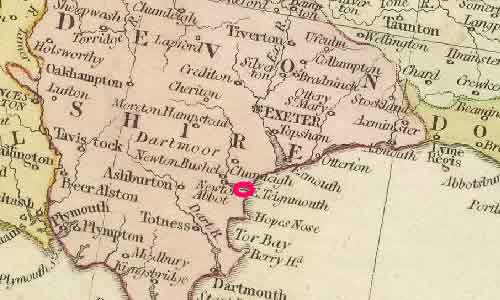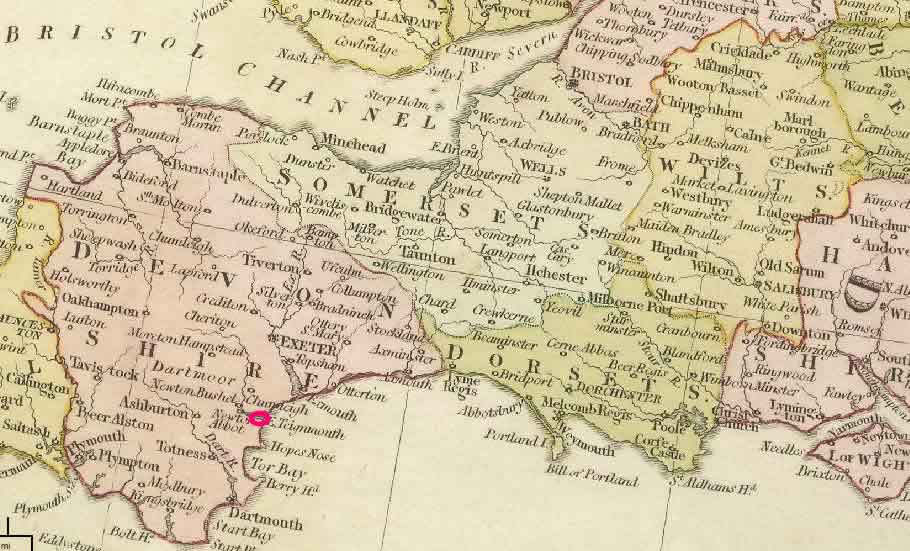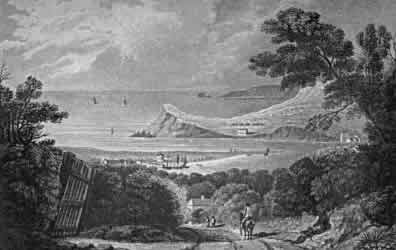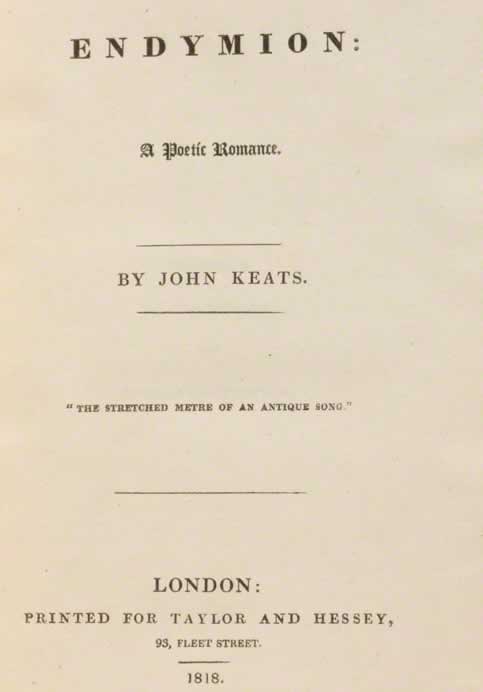6 March-4 May 1818: Floody, Muddy; Keats’s Announced Immaturity; & a Mansion of Many Apartments
Teignmouth, Devon


Travelling through Exeter during a serious storm, Keats joins his sick brother, Tom, in Teignmouth, Devon, for two months,
beginning 6 March. He leaves Teignmouth 4 May and arrives back in London a few days
later.
Keats wavers about Tom’s recovery. Tom has hemorrhages about a week after Keats arrives,
and
they seem to continue. Although during the first week it does nothing but rain, Keats
eventually does some walking and sightseeing, but it generally remains wet—splashy, rainy,
misty snowy, foggy, haily floody, muddy,
he playfully complains to a friend (letters, 13
March); a month later, Rain! Rain! Rain!
(letters, 10 April). His goal is to put the
final strokes on his long and testing poem, the four-book, 4,050-line Endymion, which he has been working on for almost a year.
Keats writes to his friend, John Hamilton Reynolds, on 14 March: I have copied my fourth Book, and shall try to write the preface soon. I wish it was
all done; for I want to forget it and make my mind free for something new.
By the third week of March, Keats is in the final stages of copying and sending Endymion to his publishers, Taylor & Hessey. By the end of his stay, Endymion is completed and, at last, behind him. It is published sometime during the last week
of April.
The first preface to Endymion that Keats writes at Teignmouth is ill-received by his publishers and
Reynolds. They suggest that it hints of his
former mentor, Leigh Hunt, and that it lacks
humility. Keats is defensive; on 9 April he writes: I have no feel of stooping. I hate the
idea of humility to them [the Public]—[/] I never wrote one single Line of Poetry
with the
least Shadow of public thought.
In that original preface, Keats writes that he hopes the
reader will note his modesty; he adds that in writing the poem his steps were all
uncertain. So this poem must rather be consider’d as an endeavour than a thing accomplish’d.
[ . . . ] I have written to please myself and in hopes to please others, and for a
love of
fame.
Keats nonetheless tries another preface and anxiously hopes it is tolerable (10 April). The publishers
accept the new preface, but it, too, has shortcomings. It invites (and will eventually
receive) severe criticism of both him and the poem’s advertised murky accomplishment.
In the
preface, Keats points to both his and the poem’s immaturity, as well as its uncertain
foundations and thick-sighted
ambitions. Somewhat extraordinarily, he declares that the
poem’s two first books, and indeed the two last,
might not be worth publication. Given
that the poem is comprised of four books, and that 2 + 2 = 4, this figuring adds up
to the
whole poem being highly suspect.

Keats is, unfortunately, right about Endymion’s deficiencies, even if, here
and there, a few worthy passages rise up out of the ordinary. In the end, though,
as Keats
realizes, there is only so much an inexperienced poet can do to decorate and profitably
amplify the bare circumstance of a shepherd’s love-sick quest to find his ideal, celestial
love—forced, at times, by rambling of unconstrained, enjambed heroic couplets, no
less. Bottom
line: too much description in search of atmosphere; too much incident; too many adventures;
too many vacillations; too many rhymes arbitrarily forcing sense; and too much sensuality
for
its own sake. But at least it is done. Time to move forward; and as he writes in the
preface
to the poem, perhaps in the future, with a mature imagination,
he can return to the
beautiful mythology of Greece.
And toward the end of the year he will, with a few
attempts to render the Hyperion myth; and when he does, he will have Milton’s poetry,
rather
than Hunt’s, as his poetic prototype.
By the very end of his stay at Teignmouth, Keats formulates significant and complex thoughts about poetry, poetic worth, and the pursuit of genuine wisdom. He does so mainly though contemplating Milton and Wordsworth’s relative style, scope, depth, and accomplishments, while noting what is lacking in Endymion. Keats realizes he must go deeper in both a philosophical and profoundly human way if he is to become a strong, enduring poet.
The noteworthy conclusion Keats comes to is that Wordsworth is deeper than Milton
:
Wordsworth, more than Milton, has moved forward to think into the human heart,
into (he
quotes from Wordsworth) the burden of the Mystery.
Keats comes to this via a simile
of human life
; he compares it to a Mansion of Many Apartments,
into which
Wordsworth has gone further than anyone else in exploring those dark Passages.
Gauging
and articulating Wordsworth’s accomplishment, Keats will show how tall I stand by the giant
[Wordsworth].
To progress, then, Keats feels he too must explore similar regions. This
is a singularly important moment for Keats, as he self-consciously fashions a statement
of
poetic purpose to which he will strive—and achieve within a year.
Toward the end of his stay in Teignmouth, then, Keats feels that, to move forward,
he needs
to deliberately study and pursue knowledge. He expresses a more forward-looking mature
purpose: I find cavalier days are gone by,
he writes (letters, 24 April).


